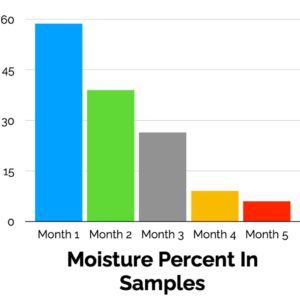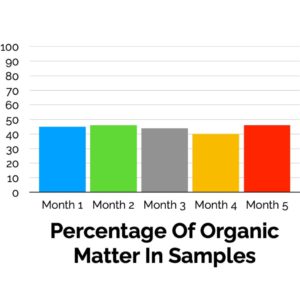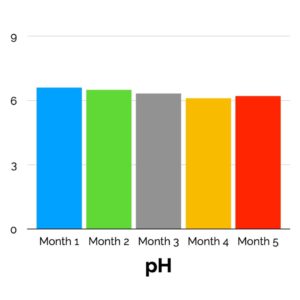We often end up with more worm compost than needed, which is, of course, a good thing. You can use your surplus later on or sell it. Regardless of what you decide, you need to store your vermicompost. Let’s talk about various aspects of worm composting storage and how can you get the best results.
How long does worm compost last? Worm compost can last one year if you store it in the right conditions. You can still use it after that period, but its quality is diminished.
How to store vermicompost
Vermicomposting storage is not complicated. It would help if you kept a few things in mind, and it will be a smooth process.
1. Do Not Use A Sealed Compartment
Even after completion, the worms and microbes are still working and decomposing. If you put the worm compost in an airtight chamber, you risk killing off any leftover worms in it. Also, in the absence of air, the anaerobic microbes can take over, resulting in a smelly pile.
2. Remove unprocessed scraps
It is not uncommon to have bits of non decomposed scraps in your finished worm compost. As the pile is still active, it can still decompose smaller bits. However, you should remove bigger scraps and the ones that will take longer to decompose. It helps in retaining the quality.
3. Use a breathable container or bag
As we mentioned above, it is crucial to keep your storage pile aerated. The best way to do it is by using a grain bag or a container with the desired number of holes.
4. Ensure the proper moisture levels
If the worm compost gets too dry, it will lose its effectiveness. The storage pile requires much less moisture than an active pile. Some farmers slightly dry the worm compost so it can be easily sifted into desired consistency.
It’s not that hard to keep your stored worm compost hydrated. You simply need to spray it with water once in a while. A grain bag loses moisture faster, requiring more hydration than a plastic container with holes.
It’s important to note that once your vermicompost dries up, it’s not possible to restore its lost life. Thought you can still use it, but it won’t be nearly as good.
5. Keep It At Room Temperature
For best results, store your worm compost at room temperature. However, since it doesn’t have to sustain any worm life, it can survive a wide range of temperatures. Just make sure that you don’t let it freeze and keep it below cooking heat.
Effect on storage on vermicompost quality
The impact of storage on vermicompost quality has always been a topic of debate. A study by the University of Wisconsin system analysed this issue in detail and gave a conclusive report.
The main features of this study were
- The vermicompost samples were stored for three months, and the changes in physical and chemical properties were analysed
- Three differently aged vermicompost samples from different sources were used
- These samples were used as soil amendments and applied to plants to measure the difference
- The growth of plants was observed
- The plant tissue was chemically analysed
- The vermicompost samples were stored at room temperature with no specific humidity control
Results
Let’s see the results of the study. For the sake of simplicity, we would take the average of three samples instead of representing them separately.
Moisture content

The moisture content in the fresh samples ranged from 55% to 63%. As the environment was not humidity controlled, the samples dried out with time. The microbial activity declines with reduced moisture levels. This activity utilises some nutrients needed for plant growth.
Organic Matter

The tests indicated slight increases and decreases in organic matter during different months. This variation could be due to continued decomposition. However, it is clear that storing does not have any significant effects on organic matter.
pH of samples

The pH of vermicompost samples was analysed using distilled water and potassium chloride. The tests show declining trends in pH values. The worm compost increases in acidity over time. This increase in acidity is due to the nitrification of ammonia by microbes. This acidity makes some nutrients more available for plant absorption.
Carbon nitrogen ratio of samples

As you can see from the graph, the carbon-nitrogen ratios remain almost unchanged during different months. There are slight increases and decreases, but they are too small to notice
Other Observations
- Differently aged vermicompost samples do not affect plant growth differently.
- Leaf width was identical with fresh and aged vermicompost.
- There is a slight loss of total nitrogen with age. This loss can be mainly attributed to the volatilisation.
The study recommended that vermicompost should be stored in low moisture conditions to dry out the mixture slowly. The slow drying reduces microbial activity and prevents the loss of nutrients by microbial use. However, too much drying could convert the nutrients into less available forms and minimise the good properties of vermicompost.
Frequently Asked Questions
1. The expiry date of vermicompost
Vermicompost does not have an expiry date. It retains most of its qualities for up to one year in proper storage conditions. After that, its potency declines gradually.
2. Does worm compost go bad?
No, worm compost does not go bad if you store it properly. Even in less than ideal conditions, it remains usable with reduced effectiveness.
If you store it improperly without proper aeration, it can turn smelly. Some people consider this bad. You should know that even the most smelly anaerobic worm compost still retains a good amount of nutrients. If you mix this with soil and apply that to your plants, you will still witness good results.
Final Thoughts
Proper storage does not significantly affect the vermicompost quality. As concluded by reliable studies, there is no noticeable difference in plant growth when aged vermicompost is used instead of the fresh one. If you have surplus worm compost, you can easily store it for a year or even more and use it whenever you desire

